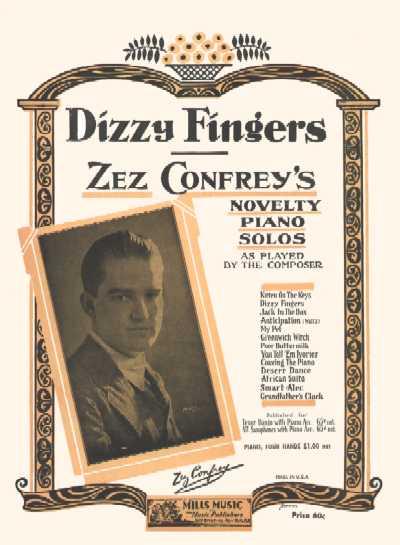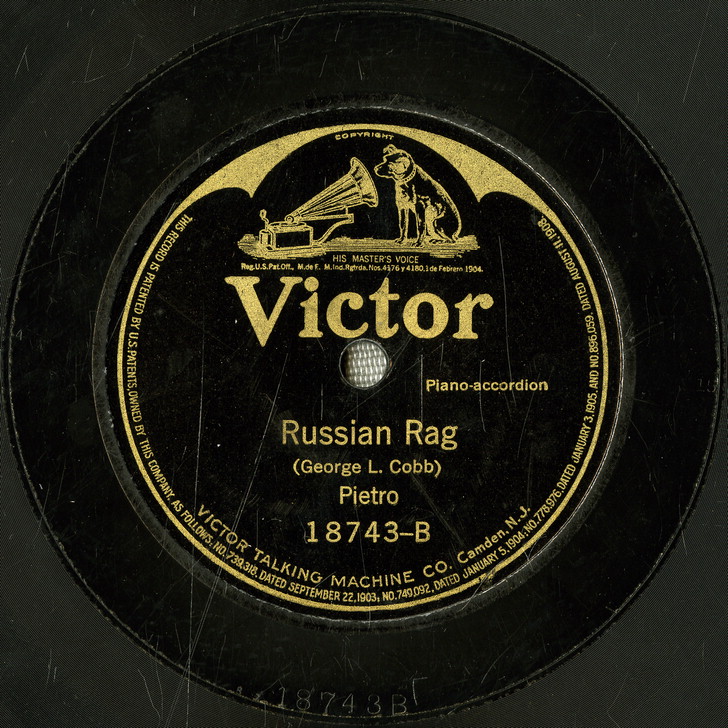|
List Of Ragtime Composers
A list of ragtime composers, including one or more famous or characteristic compositions. Pre-1940 *Felix Arndt (1889–1918),"Desecration Rag" (1914), "Nola" (1916), "Operatic Nightmare" (1916) *May Aufderheide (1888–1972), "Dusty Rag" (1908) *Roy Bargy (1894–1974), "Pianoflage" (1922) *Harry Belding (1882–1931), "Good Gravy Rag" (1913) *Theron C. Bennett (1879–1937), "The St. Louis Tickle" (1904) *Irving Berlin (1888–1989), "Alexander's Ragtime Band" (1911) *Jean Schwartz (1878-1956), “April Fool Rag” (1911) *Mike Bernard (musician), Mike Bernard (1875-1938), "The Ragtime King" (1899), "The Battle of San Juan Hill" (1912), "Tantalizing Tingles" (1913) *Charlotte Blake (1885–1979), “The Gravel Rag” (1908), "That Poker Rag" (1909) *Eubie Blake (1887–1983), "Charleston Rag" (1903), "Chevy Chase" (1914), "Fizz Water" (1914) *Rube Bloom (1902–1976), "That Futuristic Rag" (1923), "Soliloquy" (1926) *Blind Boone (1864–1927), "Southern Rag Medley No. 2" (1909) * ... [...More Info...] [...Related Items...] OR: [Wikipedia] [Google] [Baidu] |
Ragtime
Ragtime, also spelled rag-time or rag time, is a musical style that had its peak from the 1890s to 1910s. Its cardinal trait is its Syncopation, syncopated or "ragged" rhythm. Ragtime was popularized during the early 20th century by composers such as Scott Joplin, James Scott (composer), James Scott, and Joseph Lamb (composer), Joseph Lamb. Ragtime pieces (often called "rags") are typically composed for and performed on piano, though the genre has been adapted for a variety of instruments and styles. Ragtime music originated within African Americans, African American communities in the late 19th century and became a distinctly American form of popular music. It is closely related to American march music, marches. Ragtime pieces usually contain several distinct themes, often arranged in patterns of repeats and reprises. Scott Joplin, known as the "King of Ragtime", gained fame through compositions like "Maple Leaf Rag" and "The Entertainer (rag), The Entertainer". Ragtime influ ... [...More Info...] [...Related Items...] OR: [Wikipedia] [Google] [Baidu] |
Zez Confrey
Edward Elzear "Zez" Confrey (3 April 1895 – 22 November 1971) - accessed August 2011 was an American composer and performer of novelty piano and jazz music. His most noted works were "Kitten on the Keys" and "Dizzy Fingers." Studying at the Chicago Musical College and becoming enthralled by Impressionism in music, French impressionists played a critical role in how he composed and performed music. Early life and education Confrey was born in Peru, Illinois, the youngest child of Thomas and Margaret Confrey. Aspiring to be a concert pianist, he attended Chicago Musical College and studied with private teachers. He later abandoned that idea for composing, encouraged by his oldest brother, James J. Confrey, an organist.Confrey, Zez, ''Zez Confrey's Modern Course in Novelty Piano Playing'' (New York: Jack ...[...More Info...] [...Related Items...] OR: [Wikipedia] [Google] [Baidu] |
Nellie Weldon Cocroft
Ellen "Nellie" Weldon Cocroft (November 4, 1885 – June 27, 1986) was an American musical composer. Early life Ellen Estelle Weldon was born on November 4, 1885, in Quitman, Georgia, the daughter of Richard Weldon and Virginia (Massey) Weldon. She was the eldest of three daughters, including Jeanivieve (b. 1893) and Minnie (b. 1896). Her father, Richard, was a traveling salesman, although he also owned the Quitman Marble Company (since 1886). In early 1904, Richard moved his family and the company twenty miles west to nearby Thomasville, Georgia, where he renamed his company the Thomasville Marble Company; among their products were memorial headstones. Career Nellie graduated with a degree in piano and organ performance in early 1905, at the age of 20, from Breneau College (now known as Brenau University). She married Christopher ("C.C.") Cocroft (also a musician) not long after, in April 1905. Nellie Cocroft was a church organist and choir director in Thomasville. Her hus ... [...More Info...] [...Related Items...] OR: [Wikipedia] [Google] [Baidu] |
Russian Rag (composition)
"Russian Rag" is a 1918 ragtime jazz piano composition by George L. Cobb. The composition was published by Francis, Day & Hunter Ltd. The composition is based on the opening chord progression of Rachmaninoff's Prelude in C-sharp minor, Op.3, No.2. The piece was such a hit that Cobb wrote ''The New Russian Rag'' in 1923 in an attempt to arrange more of the Rachmaninoff prelude for ragtime piano. Elena Kats-Chernin wrote another later piano composition entitled ''Russian Rag'' in 1996. References External links Russian Rag (Cobb, George L.)from IMSLP The International Music Score Library Project (IMSLP), also known as the Petrucci Music Library after publisher Ottaviano Petrucci, is a subscription-based digital library of public domain, public-domain sheet music, music scores. The project use ... 1918 compositions Jazz compositions in C-sharp minor Piano compositions by American composers Rags Songs with music by George L. Cobb {{jazz-composition-stub ... [...More Info...] [...Related Items...] OR: [Wikipedia] [Google] [Baidu] |
George L
George may refer to: Names * George (given name) * George (surname) People * George (singer), American-Canadian singer George Nozuka, known by the mononym George * George Papagheorghe, also known as Jorge / GEØRGE * George, stage name of Giorgio Moroder * George, son of Andrew I of Hungary Places South Africa * George, South Africa, a city ** George Airport United States * George, Iowa, a city * George, Missouri, a ghost town * George, Washington, a city * George County, Mississippi * George Air Force Base, a former U.S. Air Force base located in California Computing * George (algebraic compiler) also known as 'Laning and Zierler system', an algebraic compiler by Laning and Zierler in 1952 * GEORGE (computer), early computer built by Argonne National Laboratory in 1957 * GEORGE (operating system), a range of operating systems (George 1–4) for the ICT 1900 range of computers in the 1960s * GEORGE (programming language), an autocode system invented by Charles Leo ... [...More Info...] [...Related Items...] OR: [Wikipedia] [Google] [Baidu] |
Edward B
Edward is an English male name. It is derived from the Anglo-Saxon name ''Ēadweard'', composed of the elements '' ēad'' "wealth, fortunate; prosperous" and '' weard'' "guardian, protector”. History The name Edward was very popular in Anglo-Saxon England, but the rule of the Norman and Plantagenet dynasties had effectively ended its use amongst the upper classes. The popularity of the name was revived when Henry III named his firstborn son, the future Edward I, as part of his efforts to promote a cult around Edward the Confessor, for whom Henry had a deep admiration. Variant forms The name has been adopted in the Iberian peninsula since the 15th century, due to Edward, King of Portugal, whose mother was English. The Spanish/Portuguese forms of the name are Eduardo and Duarte. Other variant forms include French Édouard, Italian Edoardo and Odoardo, German, Dutch, Czech and Romanian Eduard and Scandinavian Edvard. Short forms include Ed, Eddy, Eddie, Ted, Teddy and ... [...More Info...] [...Related Items...] OR: [Wikipedia] [Google] [Baidu] |
Axel Christensen (composer)
Axel Waldemar Christensen (March 23, 1881 – August 17, 1955) was an American composer, arranger, publisher, pianist and music instructor. He was the founder of the Christensen School of Popular Music, under which he published various instruction books about the playing of syncopated music. The school enrolled upwards of 500,000 students in its numerous branches across the United States, making it one of the first and most successful examples of standardizing the instruction of popular music. The school also published the music magazine 'Christensen Ragtime Review'. His formal attire and preference for grand pianos gave him the vaudeville title 'Czar of Ragtime'. Life and career Axel Christensen was born in 1881 in Chicago, Illinois to Danish parents Charles and Mary Christensen. Playing classical music from an early age, he would first delve into the popular ragtime music in his teenage years. He would marry Reine Annette Swanson in 1903, a marriage that would last until his de ... [...More Info...] [...Related Items...] OR: [Wikipedia] [Google] [Baidu] |
Heliotrope Bouquet
"Heliotrope Bouquet" is a 1907 rag composed by Scott Joplin and Louis Chauvin. The first section of the piece is unique in ragtime for its structure, rhythm and melody. Music historian Bill Edwards has speculated that this and the second section were most likely contributed by Chauvin, while the third and fourth section show Joplin’s style of composing. See also *List of compositions by Scott Joplin
The following is a complete list of musical compositions by Scott Joplin (November 24, 1868 – April 1, 1917).
Scott Joplin was born in Arkansas in about 1867, j ...
[...More Info...] [...Related Items...] OR: [Wikipedia] [Google] [Baidu] |
Louis Chauvin
Louis Chauvin (March 13, 1881March 26, 1908) was an American ragtime pianist and composer. Early life and education Born in St. Louis, Missouri, to a Mexican Spanish-Indian father and an African American mother, he was widely considered the finest pianist in the St. Louis area at the turn of the century. He was part of the ragtime community that met at Tom Turpin's Rosebud bar with Joe Jordan and others. Sam Patterson, a musician and life-long friend of Chauvin, later described him as, About five feet five and never over 145 pounds. He looked delicate with his fine features and his long, tapering fingers, but he was wild and strong. He never gambled, but he stayed up, drank, and made lots of love. He loved women, but he treated them like dirt. He always had two or three. He loved whisky, too, but he only seemed to be living when he was at the piano. It's authentic, I guess, that he smoked opium at the last Career Chauvin left only three published compositions and died without ... [...More Info...] [...Related Items...] OR: [Wikipedia] [Google] [Baidu] |
(Won't You Come Home) Bill Bailey
"(Won't You Come Home) Bill Bailey", originally titled "Bill Bailey, Won't You Please.... Come Home?" is a popular song published in 1902. It is commonly referred to as simply "Bill Bailey". The words and music were written by Hughie Cannon, an American songwriter and pianist, and it was published by Howley, Haviland and Dresser. It is still a standard with Dixieland and traditional jazz bands. The simple 32-bar chord sequence of its chorus also underpins many other tunes played mainly by jazz bands, such as " Over the Waves", " Washington and Lee Swing", " Bourbon Street Parade", "My Little Girl", and the final themes of "Tiger Rag" and " The Beer Barrel Polka". Origin Cannon wrote the song in 1902 when he was working as a bar pianist at Conrad Deidrich's Saloon in Jackson, Michigan. Willard "Bill" Bailey, also a jazz musician, was a regular customer and friend, and one night told Cannon about his marriage to Sarah (née Siegrist). Cannon "was inspired to rattle off a ditty a ... [...More Info...] [...Related Items...] OR: [Wikipedia] [Google] [Baidu] |
Hughie Cannon
Hugo Cannon (April 9, 1877 – June 17, 1912) was an American songwriter and pianist whose best-known composition was the popular ragtime song " (Won't You Come Home) Bill Bailey". Biography Cannon was born in Detroit, Michigan in 1877. He began performing with Barlow's Minstrels in the 1890s, as a singer, dancer, and piano player, often working with actor John Queen and having several songs published. Bill Edwards, "Hugo "Hughie" Cannon", ''RagPiano.com'' Retrieved 5 April 2017 He occasionally worked as a bar pianist in , where he met local musician Willard "Bill" Bailey. Reportedly, on one occasion in 1902, Bailey was talking to Cannon about the ... [...More Info...] [...Related Items...] OR: [Wikipedia] [Google] [Baidu] |




